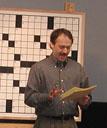Just found this and thought I’d pass it on. We’ll have to wait and see what the format is and how we can link to the puzzles online … since they are not traditional crosswords.
NEW YORK, Jan. 15, 2010 (GLOBE NEWSWIRE) — The Wall Street Journal is expanding its regular weekend line-up of crosswords and puzzles and will now feature cryptic, acrostic and novelty offerings with the debut of The Saturday Puzzle in tomorrow’s Weekend Edition.
“The Journal is already home to an outstanding Friday crossword, and readers will no doubt relish our new Saturday line-up of adventurous and addictive puzzles,” said Robert Thomson, editor-in-chief of Dow Jones & Company and managing editor of The Wall Street Journal. “Our aim is to amuse and bemuse intelligent people.”
Following the regular Friday Puzzle in Weekend Journal, The Saturday Puzzle rotation will feature:
* Emily Cox and Henry Rathvon, creators of the Atlantic’s Puzzler,
will contribute a cryptic crossword every four weeks. Readers
who are new to cryptics, which rely on cleverness and wordplay,
can consult a guide to solvers on WSJ.com;
* Patrick Berry, author of the “Puzzle Masterpieces” collection,
and Mike Shenk, the Journal’s crossword editor, will offer a
novelty word puzzle every two weeks that explodes the usual
across-and-down grid and replaces it with snakes, snowflakes,
honeycombs, and other mind-bending shapes;
* Mr. Shenk also offers an acrostic every four weeks, in which a
solver fills in answers to clues and transfers the letters to
a grid that spells out a secret quotation.



